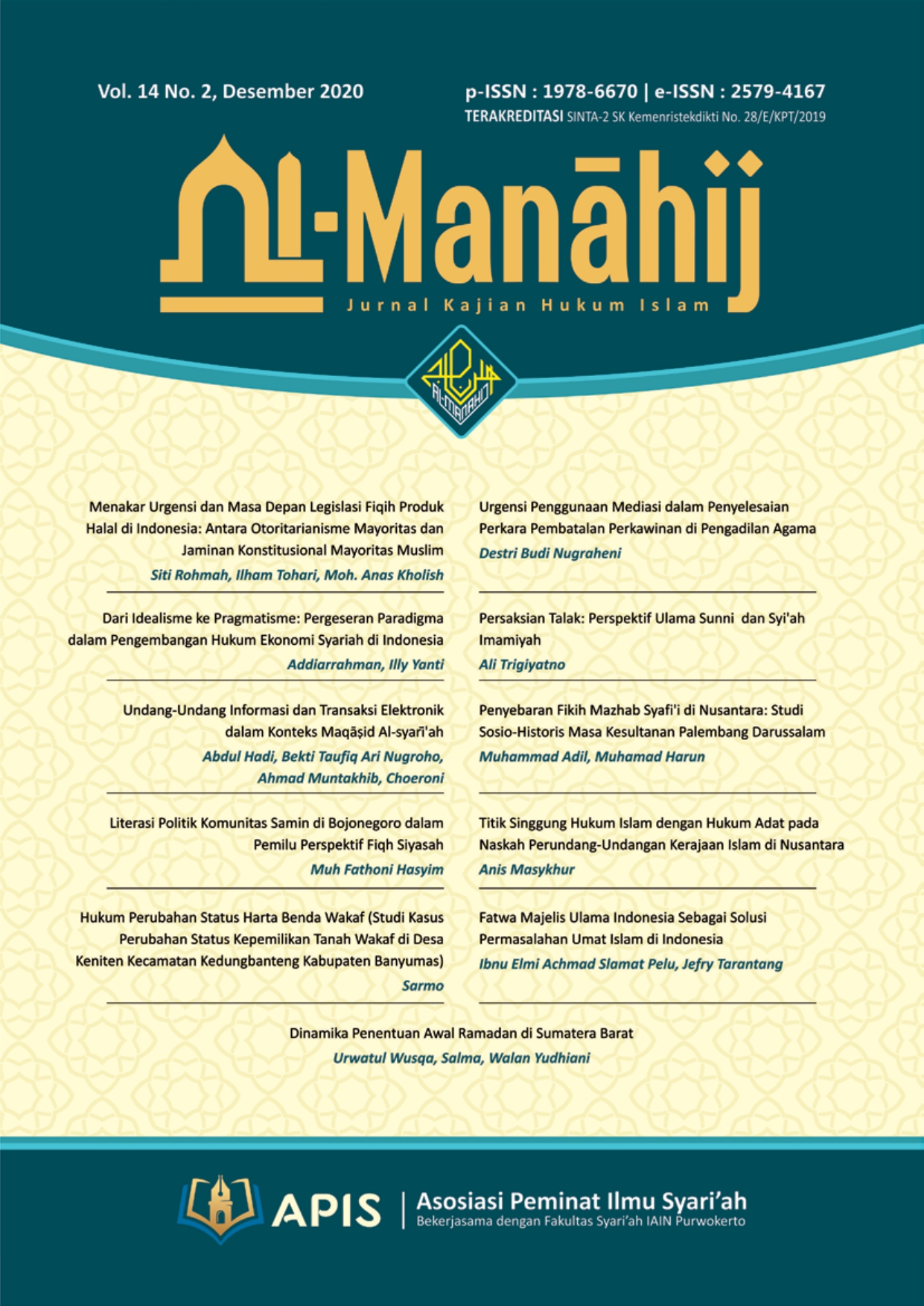Fatwa Majelis Ulama Indonesia sebagai Solusi Permasalahan Umat Islam di Indonesia
DOI:
https://doi.org/10.24090/mnh.v14i2.3927Keywords:
MUI, fatwa, solutions, problems of the peopleAbstract
The Indonesian Ulema Council (MUI) has an important role in answering the increasingly complex problems of Muslims through fatwas. However, in the Indonesian legal system, fatwas are not considered a source of material law that has legal validity as a solution to the problems of Muslims in Indonesia. Therefore, this study aims to describe the position of fatwas in the legal system in Indonesia and the existence of the fatwas of the Indonesian Ulema Council in addressing the problems of the ummah. This research is a normative legal research using three types of approaches consisting of a statutory approach, a historical approach, and a conceptual approach. The results of this study concluded that: firstly, the position of fatwas in the construction of Islamic law has a high position. Fatwas are seen as a solution that can break the ice in legal development that is not accommodated by the texts of the Quran. So, substantively and sociologically, fatwas have a strong and binding position in Islamic law. Secondly, the existence of the fatwa of the Indonesian Ulema Council in responding to the problems of the Ummah can be seen in two aspects. The first aspect, fatwas in the perspective of Islamic legal authority are binding sociologically in substance. This is because fatwas are explanations and interpreters of the texts of the Quran regarding Islamic law. The second aspect, fatwas from the perspective of the hierarchy of laws and regulations, legally and formally, do not have any position in the ranking of legal norms. However, it is constitutionally guaranteed through Article 29 of the 1945 Constitution that guarantees the realization of the fulfillment of all Islamic law for Muslims in Indonesia.Downloads
Download data is not yet available.
References
Ahmed, Wahbalbari Amir. ‘The Concept of Scarcity and Its Implication on Human Behaviour: Searching the Qur’anic Perspective’ 14, no. 1, 2010.
Assyaukanie, Luthfi. ‘Fatwa and Violence in Indonesia'. Sunni Islam 11, 2009. https://www.scribd.com/document/76445429/Fatwa-and-Violence-in-Indonesia.
Azzarqa, Azzarqa, and Saif Uddin. ‘Legal Opinion (Fatwa) of MUI (Council of Indonesian Ulama’) on Ahmadiyah’. Az Zarqa’ 4, no. 2, December 2014. http://ejournal.uin-suka.ac.id/syariah/azzarqa/article/view/1307.
Barlinti, Yeni Salma. Kedudukan fatwa Dewan Syariah Nasional dalam sistem hukum nasional di Indonesia. Badan Litbang dan Diklat, Kementerian Agama RI, 2010.
Cholil Nafis, M. Teori Hukum Ekonomi Syariah. Jakarta: UI Press, 2011.
Gayo, Ahyar Ari, and Ade Irawan Taufik. "Kedudukan Fatwa Dewan Syariah Nasional Majelis Ulama Indonesia dalam Mendorong Perkembangan Bisnis Perbankan Syariah (Perspektif Hukum Perbankan Syariah)". Jurnal Rechts Vinding: Media Pembinaan Hukum Nasional 1, no. 2, 2012.
Gillespie, Piers. ‘Current Issues in Indonesian Islam: Analysing the 2005 Council of Indonesian Ulama Fatwa No. 7 Opposing Pluralism, Liberalism and Secularism’. Journal of Islamic Studies 18, no. 2, May 2007. https://doi.org/10.1093/jis/etm001.
Hadi, Syamsul. ‘The Indonesian Council of Ulama’. Indonesia Circle. School of Oriental & African Studies. Newsletter 18, no. 50, November 1989. https://doi.org/10.1080/03062848908729718.
Hasyim, Syafiq. ‘Irasec - The Council of Indonesian Ulama (Majelis Ulama Indonesia, MUI) and Religious Freedom’. Bangkok, Thailand: Research Institute on Contemporary Southeast Asia (IRASEC), 2011. http://www.irasec.com/ouvrage36.
Hasyim, Syafiq. ‘Majelis Ulama Indonesia and Pluralism in Indonesia’. Philosophy & Social Criticism 41, no. 5, May 2015. https://doi.org/10.1177/0191453714566547.
Hosen, Nadirsyah. ‘Behind the Scenes: Fatwas of Majelis Ulama Indonesia (1975–1998)’. Journal of Islamic Studies 15, no. 2, May 2004. https://doi.org/10.1093/jis/15.2.147.
Ichwan, Moch Nur. ‘Official Ulema and the Politics of Re-Islamization: The Majelis Permusyawaratan Ulama, Sharīʿatization and Contested Authority in Post-New Order Aceh’. Journal of Islamic Studies 22, no. 2, 2011.
Ichwan, Moch Nur. ‘The Local Politics of Orthodoxy: The Majelis Ulama Indonesia in the Post-New Order Banten’. Journal of Indonesian Islam 6, no. 1, June 2012. https://doi.org/10.15642/JIIS.2012.6.1.166-194.
La Jamaa. ‘Fatwas of the Indonesian Council of Ulama and Its Contributions to the Development of Contemporary Islamic Law in Indonesia | Jamaa | Indonesian Journal of Islam and Muslim Societies’. Indonesian Journal of Islam and Muslim Societies 8, 2018. https://doi.org/10.18326/ijims.v8i1.29-56.
Lindsey, Tim. ‘Monopolising Islam: The Indonesian Ulama Council and State Regulation of the “Islamic Economyâ€: Bulletin of Indonesian Economic Studies: Vol 48, No 2’, 2013. https://www.tandfonline.com/doi/abs/10.1080/00074918.2012.694157.
Millie, Julian, and Linda Hindasah. ‘Regional Aspects of the Indonesian Ulama Council’s Ideological Turn’. The Asia Pacific Journal of Anthropology 16, no. 3, May 2015. https://doi.org/10.1080/14442213.2015.1034167.
Nasir, Mohamad Abdun. ‘The Ê¿UlamÄʾ, FatÄwÄ and Challenges to Democracy in Contemporary Indonesia’. Islam and Christian–Muslim Relations 25, no. 4, October 2014. https://doi.org/10.1080/09596410.2014.926598.
Sirry, Mun’im. ‘Fatwas and Their Controversy: The Case of the Council of Indonesian Ulama (MUI)’. Journal of Southeast Asian Studies 44, no. 1, February 2013. https://doi.org/10.1017/S0022463412000641.
Syafei, Zakaria. ‘Tracing Maqasid al-Shari‘ah in the Fatwas of Indonesian Council of Ulama (MUI)’. Journal of Indonesian Islam 11, no. 1, July 2017. https://doi.org/10.15642/JIIS.2017.11.1.99-124.
Zaman, Arshad-Uz. ‘Fatwa and the High Court’. Interventions 4, no. 2, January 2002. https://doi.org/10.1080/13698010220144289.
Assyaukanie, Luthfi. ‘Fatwa and Violence in Indonesia'. Sunni Islam 11, 2009. https://www.scribd.com/document/76445429/Fatwa-and-Violence-in-Indonesia.
Azzarqa, Azzarqa, and Saif Uddin. ‘Legal Opinion (Fatwa) of MUI (Council of Indonesian Ulama’) on Ahmadiyah’. Az Zarqa’ 4, no. 2, December 2014. http://ejournal.uin-suka.ac.id/syariah/azzarqa/article/view/1307.
Barlinti, Yeni Salma. Kedudukan fatwa Dewan Syariah Nasional dalam sistem hukum nasional di Indonesia. Badan Litbang dan Diklat, Kementerian Agama RI, 2010.
Cholil Nafis, M. Teori Hukum Ekonomi Syariah. Jakarta: UI Press, 2011.
Gayo, Ahyar Ari, and Ade Irawan Taufik. "Kedudukan Fatwa Dewan Syariah Nasional Majelis Ulama Indonesia dalam Mendorong Perkembangan Bisnis Perbankan Syariah (Perspektif Hukum Perbankan Syariah)". Jurnal Rechts Vinding: Media Pembinaan Hukum Nasional 1, no. 2, 2012.
Gillespie, Piers. ‘Current Issues in Indonesian Islam: Analysing the 2005 Council of Indonesian Ulama Fatwa No. 7 Opposing Pluralism, Liberalism and Secularism’. Journal of Islamic Studies 18, no. 2, May 2007. https://doi.org/10.1093/jis/etm001.
Hadi, Syamsul. ‘The Indonesian Council of Ulama’. Indonesia Circle. School of Oriental & African Studies. Newsletter 18, no. 50, November 1989. https://doi.org/10.1080/03062848908729718.
Hasyim, Syafiq. ‘Irasec - The Council of Indonesian Ulama (Majelis Ulama Indonesia, MUI) and Religious Freedom’. Bangkok, Thailand: Research Institute on Contemporary Southeast Asia (IRASEC), 2011. http://www.irasec.com/ouvrage36.
Hasyim, Syafiq. ‘Majelis Ulama Indonesia and Pluralism in Indonesia’. Philosophy & Social Criticism 41, no. 5, May 2015. https://doi.org/10.1177/0191453714566547.
Hosen, Nadirsyah. ‘Behind the Scenes: Fatwas of Majelis Ulama Indonesia (1975–1998)’. Journal of Islamic Studies 15, no. 2, May 2004. https://doi.org/10.1093/jis/15.2.147.
Ichwan, Moch Nur. ‘Official Ulema and the Politics of Re-Islamization: The Majelis Permusyawaratan Ulama, Sharīʿatization and Contested Authority in Post-New Order Aceh’. Journal of Islamic Studies 22, no. 2, 2011.
Ichwan, Moch Nur. ‘The Local Politics of Orthodoxy: The Majelis Ulama Indonesia in the Post-New Order Banten’. Journal of Indonesian Islam 6, no. 1, June 2012. https://doi.org/10.15642/JIIS.2012.6.1.166-194.
La Jamaa. ‘Fatwas of the Indonesian Council of Ulama and Its Contributions to the Development of Contemporary Islamic Law in Indonesia | Jamaa | Indonesian Journal of Islam and Muslim Societies’. Indonesian Journal of Islam and Muslim Societies 8, 2018. https://doi.org/10.18326/ijims.v8i1.29-56.
Lindsey, Tim. ‘Monopolising Islam: The Indonesian Ulama Council and State Regulation of the “Islamic Economyâ€: Bulletin of Indonesian Economic Studies: Vol 48, No 2’, 2013. https://www.tandfonline.com/doi/abs/10.1080/00074918.2012.694157.
Millie, Julian, and Linda Hindasah. ‘Regional Aspects of the Indonesian Ulama Council’s Ideological Turn’. The Asia Pacific Journal of Anthropology 16, no. 3, May 2015. https://doi.org/10.1080/14442213.2015.1034167.
Nasir, Mohamad Abdun. ‘The Ê¿UlamÄʾ, FatÄwÄ and Challenges to Democracy in Contemporary Indonesia’. Islam and Christian–Muslim Relations 25, no. 4, October 2014. https://doi.org/10.1080/09596410.2014.926598.
Sirry, Mun’im. ‘Fatwas and Their Controversy: The Case of the Council of Indonesian Ulama (MUI)’. Journal of Southeast Asian Studies 44, no. 1, February 2013. https://doi.org/10.1017/S0022463412000641.
Syafei, Zakaria. ‘Tracing Maqasid al-Shari‘ah in the Fatwas of Indonesian Council of Ulama (MUI)’. Journal of Indonesian Islam 11, no. 1, July 2017. https://doi.org/10.15642/JIIS.2017.11.1.99-124.
Zaman, Arshad-Uz. ‘Fatwa and the High Court’. Interventions 4, no. 2, January 2002. https://doi.org/10.1080/13698010220144289.
Downloads
Published
03-12-2020
How to Cite
Pelu, I. E. A. S., & Tarantang, J. (2020). Fatwa Majelis Ulama Indonesia sebagai Solusi Permasalahan Umat Islam di Indonesia. Al-Manahij: Jurnal Kajian Hukum Islam, 14(2), 307–316. https://doi.org/10.24090/mnh.v14i2.3927
Issue
Section
ARTICLES
License
Authors who publish with this journal agree to the following terms:
- Authors retain copyright and grant the journal right of first publication with the work simultaneously licensed under a Creative Commons Attribution License that allows others to share the work with an acknowledgement of the work's authorship and initial publication in this journal.
- Authors are able to enter into separate, additional contractual arrangements for the non-exclusive distribution of the journal's published version of the work (e.g., post it to an institutional repository or publish it in a book), with an acknowledgement of its initial publication in this journal.
- Authors are permitted and encouraged to post their work online (e.g., in institutional repositories or on their website) prior to and during the submission process, as it can lead to productive exchanges, as well as earlier and greater citation of published work (See The Effect of Open Access).


















